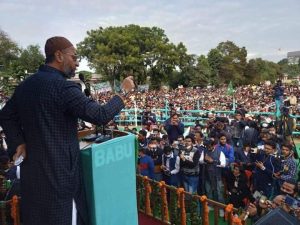In a few days, the northern Indian state of Uttar Pradesh will begin voting in a seven-phase election that will extend over a month. As the polls open, all eyes are on Uttar Pradesh’s Muslims.
Comprising roughly 19 percent of the state’s populations, Muslims play an influential role in elections, especially in constituencies where their numbers are high — as in western Uttar Pradesh, which will vote in the first phase on February 10.
The question is whether Muslims will vote for one party or divide their votes among several parties, ultimately benefiting the Hindu nationalist Bharatiya Janata Party (BJP), currently in power both at the center and in Uttar Pradesh.
The BJP’s strategy has been to polarize society along communal lines with a view to cornering the votes of the Hindu majority. And to this end, Chief Minister Yogi Adityanath has been making polarizing statements, pitting Hindus against Muslims.
A firebrand Hindu cleric who is notorious for demonizing Muslims and Islam, and leading attacks on Muslims, Yogi became chief minister of the state in 2017. Under his rule, Uttar Pradesh has enacted laws and introduced policies targeting Muslims and punishing them, directly or indirectly: framing anti-conversion or “love jihad” laws, arresting Muslim clerics for alleged mass conversion of Hindus, pushing a controversial population bill, and allowing police officers to kill with impunity. The Yogi government has left no stone unturned to corner Muslims and marginalize them. It has even renamed places in Uttar Pradesh that had names of Islamic origin, and erased the Muslim component of the history of Uttar Pradesh and India.
Yogi has not only maligned Muslims but also accused opposition parties of discriminating against Hindus. At a public rally in Kushinagar in September, Yogi said that it was only those who used the term “abba jaan” (literally “dear father” but code for Muslims) who benefited from state subsidized food rations in Uttar Pradesh, meaning that before the BJP came to power in the state, Hindus did not receive their due.
In January, he said that Uttar Pradesh would witness an “80 percent versus 20 percent” election, depicting the assembly election as a Hindu versus Muslim contest. The BJP has been appealing to Hindus to unify across caste lines; Muslim unity is often used to justify this appeal. Yogi characteristically stitches together Muslims, Pakistan, and extremism in his speeches.
More recently, Yogi claimed that Uttar Pradesh has not witnessed communal riots since the BJP came to power.
Yogi’s speeches not only vilify Muslims but also is based on lies.
Across India, targeted harassment and systematic brutalization against Muslims by Hindutva groups affiliated with the BJP has grown manifold, especially after the BJP was swept to power in the 2014 general elections and won with an even bigger majority in the 2019 elections. The fanaticism channeled by Hindutva propagandists won huge traction among voters in Uttar Pradesh, who handed the party a decisive victory in the 2017 state assembly elections. Hindus voted for the BJP in such large numbers that the Muslim vote was relegated to irrelevance.
Muslim representation in state and national legislatures have dipped to new lows since 2014. In 2014, not a single Muslim candidate from Uttar Pradesh was elected to the Lok Sabha, India’s lower house of parliament. In the 2019 general election, only six Muslims won from Uttar Pradesh.
There were 63 Muslim legislators in the 403-member Uttar Pradesh state assembly in 2012. This slipped to 24 in 2017. Muslims comprise just 5.9 percent of the current assembly, laying bare the marginalized role that the community plays in policy and law making in a state where they make-up almost one-fifth of the population.
In such a state, what are the options of Muslim voters?
Muslim voters have a number of concerns to worry about when it comes to casting their vote. They have to consider whether the candidate or party they vote for will marginalize them further. They also worry that parties could be exploiting their religious identity for petty political gains.
Samajwadi Party (SP) chief and former chief minister Akhilesh Yadav, who is the BJP’s principal challenger in the upcoming elections, has drawn huge crowds at recent election rallies. The SP has traditionally drawn votes from the Yadav caste. This time, several non-Yadav castes of the Other Backward Classes (OBC) category have moved away from the BJP to support him, as have Dalits who could shift support away from the Bahujan Samaj Party. Many Muslims see the SP as a secular party they could support.
Meanwhile, the predominantly Muslim All India Majlis-e-Ittehadul-Muslimeen (AIMIM), which is led by Asaduddin Owaisi, is also being considered by Muslim voters as a credible choice. The AIMIM had contested the 2017 assembly election in Uttar Pradesh but failed to win any seats. Owaisi has announced plans to field 100 candidates in the Uttar Pradesh elections.
Analysts say that the AIMIM acted as vote cutters, severing the prospects of several Muslim candidates fielded by secular parties by taking away a chunk of the minority votes. The BJP benefited as a result.
Owaisi appears to have convinced a section of Muslims to believe that secular parties like the SP, Congress, and the BSP have used the community as a “vote bank,” drawing on their support during elections and forgetting them after coming to power.
Political analysts say that the Muslim community is waiting till the last minute to make their decision. They will vote to support the candidate who is in the strongest position to defeat the BJP.
Muslims seem torn between Owaisi and the SP-led coalition. The support Owaisi is rallying has rattled the other parties in the fray.

































